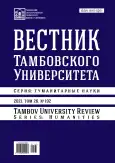Prospects for the evolution of a foreign language textbook for a non-linguistic university
- Authors: Evdokimova M.G.1
-
Affiliations:
- National Research University of Electronic Technology
- Issue: Vol 26, No 192 (2021)
- Pages: 7-15
- Section: THEORY AND METHODS OF FOREIGN LANGUAGE TEACHING
- URL: https://bakhtiniada.ru/1810-0201/article/view/298380
- DOI: https://doi.org/10.20310/1810-0201-2021-26-192-7-15
- ID: 298380
Cite item
Full Text
Abstract
We discuss issues related to rethinking the general status of a textbook as the main aid of teaching, its place and role in the system of teaching a foreign language (FL) at non-linguistic universities. A retrospective analysis of the main trends in the development of the concept of the foreign language textbook, the history of the transformation of its forms, functions and significance is given. The increasing role of modern multimedia textbooks and integrated digital linguistic educational environments as an alternative to the traditional textbook is shown. The need for the textbook authors to take into account modern scientific and methodic ideas about the target, content and procedural aspects of foreign language education is proved. The increasing relevance of intra-university publications is shown. An integrative methodology is proposed as a guideline for the development of the concept of a modern foreign language textbook at a non-linguistic university. The productivity of integrating profession-oriented foreign language training, the competencebased, communicative and intercultural approaches is substantiated. The contextual approach is considered as a way to actualize the profession-oriented vector of teaching foreign language at a non-linguistic university. It is shown that the implementation of the contextual approach requires that departments of foreign languages at non-linguistic universities of various profiles should specify the content of teaching a foreign language, in order to identify and clarify the features of professional communication of the specialists of a particular profile. In this case, it is necessary to take into account not only purely scientific and technical/ontological (subject context), but social, communicative, organizational aspects of communication (social context) as well. Summing up the results of the undertaken analysis, the author formulates the requirements for the content and structure of a modern textbook. A forecast is presented regarding the most probable directions of evolution of a foreign language textbook for non-linguistic universities.
About the authors
M. G. Evdokimova
National Research University of Electronic Technology
Author for correspondence.
Email: me49@mail.ru
ORCID iD: 0000-0001-8033-1077
Doctor of Pedagogy, Associate Professor, Director the Institute of Linguistic and Pedagogical Education
1, Shokin Sq., Zelenograd 124498, Moscow Region, Russian FederationReferences
- Davidenko E.S. Sozdaniye sovremennogo uchebnika inostrannogo yazyka dlya neyazykovogo vuza v kon-tekste lichnostno oriyentirovannoy obrazovatel’noy paradigmy [Creation of a modern textbook of a foreign language for a non-linguistic university in the context of a personality-oriented educational paradigm]. 6 Mezhdunarodnaya nauchno-prakticheskaya internet-konferentsiya «Gumanitarnoye obrazovaniye v ekono-micheskom vuze» [6th International Scientific and Practical Internet Conference “Humanitarian Education in Economic University”]. 2017, no. 014/1. (In Russian). Available at: https://www.rea.ru/ru/conference/ eheu/SiteAssets/Pages/conference-papers/Davidenko.pdf (accessed 15.01.2021).
- Nefedov O.V., Ivanovskaya I.P. Sozdaniye uchebnika po inostrannomu yazyku dlya studentov neyazykovykh vuzov [Creation of a foreign language textbook for students of non-linguistic universities]. Vestnik Mariyskogo gosudarstvennogo universiteta [Bulletin of the Mari State University], 2018, vol. 12, no. 1, pp. 83-89. (In Rus-sian).
- Pavlova I.P. Sovremennyy uchebnik inostrannogo yazyka dlya neyazykovogo vuza: problemy i perspektivy [Modern textbook of a foreign language for a non-linguistic university: problems and prospects]. Vestnik Moskovskogo gosudarstvennogo lingvisticheskogo universiteta [Bulletin of the Moscow State Linguistic University], 2011, no. 12 (618), pp. 43-60. (In Russian).
- Popova I.Y. Sozdaniye uchebnika novogo pokoleniya po inostrannomu yazyku dlya neyazykovykh vuzov v usloviyakh izmeneniya paradigmy vysshego obrazovaniya [Creation of a new generation textbook on a foreign language for non-linguistic universities in the context of a changing paradigm of higher education]. Uchenyye zapiski Orlovskogo gosudarstvennogo universiteta [Scientific Notes of Orel State University], 2019, no. 2 (83), pp. 301-303. (In Russian).
- Blinov V.I., Sergeyev I.S., Esenina E.Y. Osnovnyye idei didakticheskoy kontseptsii tsifrovogo professional’nogo obrazovaniya i obucheniya [Basic Ideas of the Didactic Concept of Digital Vocational Education and Training]. Moscow, “Pero” Publ., 2019, 24 p. (In Russian).
- Evdokimova M.G. Innovatsionnaya sistema professional’no oriyentirovannogo obucheniya inostrannym yazy-kam v neyazykovom vuze [An Innovative System of Professionally Oriented Teaching of Foreign Languages in a Non-Linguistic University]. Moscow, BIBLIO-GLOBUS Publ., 2017, 436 p. (In Russian).
- Adnana A.H.M., Zamarib Z.M. Computer-Aided Self-Access Language Learning: Views of Indonesian. Proce-dia – Social and Behavioral Sciences, 2018, no. 67, pp. 49-60. (In Irish).
- Cong-Lem N. Web-based language learning (WBLL) for enhancing L2 speaking performance: a review. Ad-vances in Language and Literary Studies, 2018, vol. 9, no. 4, pp. 143-152.
- Pareja-Lora A., Calle-Martínez P., Rodríguez-Arancón C. (eds.). New Perspectives on Teaching and Working with Languages in the Digital Era. Dublin, Research-publishing.net Publ., 2016.
- Verbitskiy A.A., Kalashnikov V.G. Kategoriya «kontekst» v psikhologii i pedagogike [Category “Context” in Psychology and Pedagogy]. Moscow, Logos Publ., 2010, 300 p. (In Russian).
- Baydikova N.L., Davidenko E.S. Angliyskiy yazyk dlya tekhnicheskikh napravleniy (B1-B2) [English for Tech-nical Profiles (B1-B2)]. Moscow, Urait Publ., 2018, 171 p. (In Russian).
- Evdokimova M.G. Integration of professional-practical aspects and value-semantic aspects of the educational ideal of homo innovaticus while training innovative engineers. Integrating Engineering Education and Humani-ties for Global Intercultural Perspectives: Proceedings of the Conference. Vol. 131. St. Petersburg, 2020, pp. 558-569. https://doi.org/10.1007/978-3-030-47415-7_59
- Testov V.A. Perekhod k novoy obrazovatel’noy paradigme v usloviyakh setevogo prostranstva [Transition to a new educational paradigm in a network space]. Vestnik Nizhegorodskogo universiteta im. N.I. Lobachevskogo [Bulletin of the National Research Lobachevsky State University of Nizhny Novgorod], 2012, no. 4 (1), pp. 50-56. (In Russian).
Supplementary files








